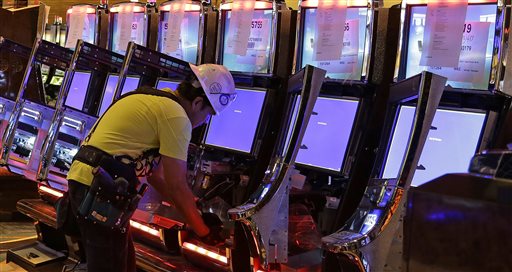By PHILLIP RAWLS
Associated Press
MONTGOMERY, Ala. - A new national report shows that revenue from Indian gambling in Alabama is growing by record numbers, while revenue from non-Indian gambling keeps falling.
The 740 pages of statistics in Casino City's North American Gaming Almanac back up what the general public can see firsthand: crowded parking lots at the Poarch Creek Indian casinos and nearly empty ones at once-popular dog tracks that now offer only simulcast races.
The report shows that total gambling revenue in Alabama, including dog tracks and casinos, grew by 25 percent in 2011. That was the biggest increase of any state. It was fueled by Indian gambling operated by the Poarch Creek Tribe. Indian gambling revenue grew by 26.4 percent in 2011, with Alabama leading the nation for the fourth year in growth.
The almanac's editor-in-chief, Vin Narayanan, said because since Indian casinos don't fall under state law, the Poarch Creeks have benefited from Alabama's shutdown of non-Indian casinos, such as VictoryLand in Shorter.
VictoryLand, a combination dog track and electronic gambling casino in Shorter, once had the largest operation in the state with 6,000 machines. The state's crackdown forced its casino to close in 2010. It reopened in December 2012 and got shut down again in February 2013.
Casino City does not publish dollar figures for some Indian gambling operations because of confidentiality agreements, but its latest Indian Gaming Industry Report notes that four states where tribes rely primarily on electronic bingo machines -- Alabama, Alaska, Nebraska and Texas -- had $531.8 million in revenue in 2011. Alabama accounted for 4,200 of the 6,631 electronic games and none of the 12 table games in those four states.
Non-Indian gambling was a different story. Non-Indian operations, primarily dog tracks, had wagering revenue of $17 million in 2011. That was a decline of 2.4 percent from the prior year and a continuation of a downward trend that has been going on since 2000, when they had $25 million in revenue, the report said.
"Indian casinos have no impact on that," Narayanan said. He said dog tracks are a dying business because their audience is graying and doesn't have the discretionary income it once did, and the tracks have not attracted younger adults.
"People aren't interested in dog racing anymore," he said.
Two dog tracks, Greenetrack in Eutaw and VictoryLand in Shorter, no longer have enough customers to support live races and now offer simulcast dog and horse races from other tracks. The Birmingham Race Course and Mobile Greyhound Park still offer live races. Alabama's Poarch Creeks bought the majority interest in the Mobile track in 2009.
The rapid growth of Indian gambling will be on display next month at the Poarch Creeks' new Wind Creek Wetumpka hotel and casino. The $250 million project, with a 20-story hotel and 2,520 electronic games, will be larger than the tribe's Wind Creek Atmore, which has 17 stories and 1,800 games.
Property manager Cody Williamson said the casino will open Dec. 17 and the hotel in late January or early February.
Despite the Indians' success in Alabama, the state is not a top-tier player in the gambling market when casinos, lotteries, card rooms, and horse and dog racing are combined. The almanac said Alabama ranked 34th among the states in total gambling revenue in 2011 and trailed all of its neighbors. Florida was fifth, Mississippi 13th, Georgia 24th and Tennessee 33rd.

